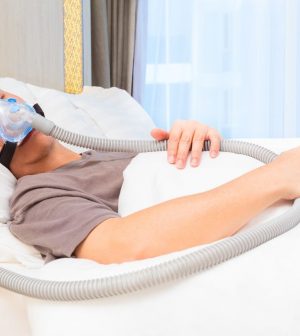- Could Your Grocery Store Meat Be Causing Recurring UTIs?
- Are You Making This Expensive Thermostat Error This Winter?
- Recognizing the Signs of Hypothyroidism
- 10 Strategies to Overcome Insomnia
- Could Artificial Sweeteners Be Aging the Brain Faster?
- Techniques for Soothing Your Nervous System
- Does the Water in Your House Smell Funny? Here’s Why
- Can a Daily Dose of Apple Cider Vinegar Actually Aid Weight Loss?
- 6 Health Beverages That Can Actually Spike Your Blood Sugar
- Treatment Options for Social Anxiety Disorder
Sleep Apnea Raises Chances of Heart Disease, Particularly in Young Adults

Sleep apnea is particularly dangerous for the heart health of young adults, even more so than in older folks, a new study warns.
The link between sleep apnea and risk factors for heart disease is stronger in people between 20 and 40 years of age than in those 40 and older, researchers reported recently in the Journal of the American Heart Association.
For example, young adults with sleep apnea had a 45% increased risk of high blood pressure, compared with a 10% increased risk in older people, results show.
Likewise, sleep apnea increased the risk of diabetes by 33% in young adults compared with 12% in middle-aged and older folks, and the risk of metabolic syndrome by 25% versus 7%, researchers found.
Young adults with sleep apnea were also three times more likely to have a cardiovascular event – such as a heart attack, heart failure, heart disease, chest pain or stroke – than young adults not suffering from the sleep disorder, results show.
“The public tends to think of sleep apnea as simply ‘bad sleep’ that causes fatigue, but the implications are far more serious,” lead researcher Bhaskar Thakur, an assistant professor of medicine with the University of Texas Southwestern, said in a news release.
Sleep apnea occurs when the upper airway collapses during sleep, disrupting a person’s breathing. People wake gasping for air regularly throughout the night, ruining their sleep.
The most significant risk factor for sleep apnea is obesity, researchers noted.
“With obesity on the rise, the number of young adults with (sleep apnea) is increasing, and without proper intervention, they are putting themselves at higher risk for a broad range of diseases and conditions,” Thakur said.
For the new study, researchers analyzed data on nearly 10,000 people 20 and older gathered as part of a regular federal health survey.
The analysis showed that people with sleep apnea symptoms – snoring, gasping, interrupted breathing while sleeping, and excessive daytime fatigue – tend to have higher rates of chest pain, heart attack and stroke.
They also tended to have risk factors associated with heart disease, researchers noted.
About half (51%) of the study participants had sleep apnea symptoms. Among them, 36% had high blood pressure, 24% had diabetes, 66% had elevated cholesterol, and 48% had metabolic syndrome.
It’s not clear why sleep apnea might contribute to heart disease, but the evidence shows that the sleep disorder should be identified and tracked, researchers said.
“Our research highlights the need for (sleep apnea) screening in primary care settings, especially for younger adults who can benefit the most from early intervention,” Thakur said. “Discussion of sleep quality and a review of (sleep apnea) symptoms should be a regular part of every adult patient’s annual physical, regardless of age.”
More information
The National Institutes of Health has more about sleep apnea.
SOURCE: University of Texas Southwestern, news release, July 9, 2024
Source: HealthDay
Copyright © 2026 HealthDay. All rights reserved.










